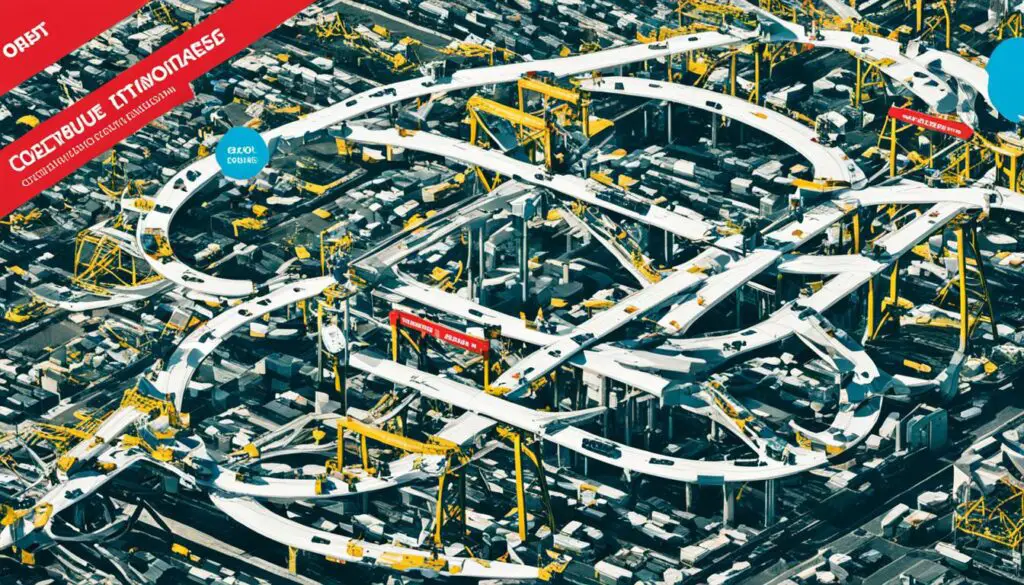In recent years, disruptive solutions have emerged as powerful tools that have the potential to transform industries and redefine innovation. These game-changing technologies are revolutionizing the way businesses operate and opening up new possibilities for growth and success. In this article, I will explore the concept of disruptive solutions and their impact on various industries, highlighting their potential to drive innovation and create competitive advantages for businesses.
Table of Contents
Key Takeaways:
- Disruptive solutions are innovative technologies that fundamentally change the way businesses operate.
- By leveraging disruptive technologies, businesses can gain a competitive advantage and capture new market opportunities.
- Disruptive solutions have transformed industries such as healthcare, finance, transportation, and retail.
- Embracing disruptive solutions requires an innovation mindset and adaptability.
- Businesses that embrace disruptive solutions can gain a competitive edge and position themselves for long-term success in the evolving digital landscape.
The Power of Disruptive Solutions
In today’s rapidly evolving business landscape, disruptive solutions have emerged as a driving force behind market disruptions and competitive advantages. These innovative technologies, born out of advancements in various industries, hold the power to revolutionize traditional markets and transform the way businesses operate.
Disruptive solutions have the potential to create significant market disruptions, shaking up established norms and challenging industry players to adapt or be left behind. By leveraging these technologies, businesses can gain a competitive edge, differentiate themselves from competitors, and unlock new market opportunities.
One of the key benefits of implementing disruptive solutions is the ability to streamline processes and enhance operational efficiency. These innovative technologies enable businesses to automate tasks, eliminate bottlenecks, and optimize workflows. By doing so, organizations can improve productivity, reduce costs, and ultimately deliver higher quality products and services to their customers.
Moreover, disruptive solutions have the potential to transform customer experiences. By harnessing these technologies, businesses can create personalized and tailored interactions, leading to increased customer satisfaction and loyalty. For example, AI-powered chatbots can provide instant and efficient customer support, enhancing the overall experience and improving customer retention rates.

Market Disruption with Disruptive Solutions
Disruptive solutions drive market disruption by challenging traditional business models and forcing industry players to adapt or risk becoming obsolete. These technologies introduce new ways of doing business, enabling companies to seize untapped opportunities and explore uncharted territories.
Disruptive solutions have the potential to redefine entire industries by displacing incumbent players and revolutionizing established markets.
By embracing disruptive technologies, businesses can gain a competitive advantage by staying ahead of the curve. These innovative solutions allow organizations to differentiate themselves from competitors, attract new customers, and capture market share.
Empowering Technology Advancements
Disruptive solutions are often born out of rapid advancements in technology. As technology continues to evolve at an unprecedented pace, the potential for disruptive innovations grows exponentially. From artificial intelligence and blockchain to virtual reality and the Internet of Things, these advancements fuel the development of disruptive solutions with the power to reshape industries.
Investing in research and development to stay at the forefront of technological advancements is crucial for businesses looking to harness the power of disruptive solutions. By staying informed about emerging technologies and their potential applications, organizations can position themselves as leaders in their respective industries and proactively adapt to changing market dynamics.
Competitive Advantage through Disruption
Amidst fierce competition, disruptive solutions can provide businesses with a much-needed competitive edge. By embracing innovation and adopting these game-changing technologies, organizations can differentiate themselves from their rivals and reshape their industries.
Implementing disruptive solutions enables businesses to leapfrog competitors, creating new market opportunities and capturing untapped customer segments. Organizations that successfully leverage disruptive technologies can surpass industry incumbents and become trailblazers, driving innovation and redefining what is possible in their respective markets.
| Key Benefits of Disruptive Solutions | Examples |
|---|---|
| Enhanced operational efficiency and streamlined processes | Automation, AI-powered analytics |
| Improved customer experiences and personalized interactions | Virtual reality, chatbots |
| Market disruptions and industry transformation | Blockchain, sharing economy |
| Competitive advantage and differentiation | IoT, big data analytics |
Industries Transformed by Disruptive Solutions
Disruptive solutions have revolutionized various industries, creating new growth opportunities and transforming traditional ways of doing business. Let’s explore how disruptive technologies have significantly impacted key industries: healthcare, finance, transportation, and retail.
Healthcare Industry
In the healthcare industry, disruptive solutions have reshaped the delivery of medical services and improved patient outcomes. Advancements in telemedicine have made healthcare more accessible, allowing patients to consult with doctors remotely. Wearable devices have enabled individuals to track their health data and proactively monitor and manage their well-being. Artificial intelligence (AI) has transformed diagnostics and treatment, enhancing accuracy and speeding up processes. By leveraging these technologies, healthcare providers can deliver more personalized and efficient care, ultimately improving the overall patient experience.
Finance Industry
The finance industry has experienced significant disruption through the adoption of disruptive technologies. Blockchain, a decentralized digital ledger, has revolutionized the way financial transactions are conducted, making them more secure, transparent, and efficient. Robo-advisors have emerged as automated investment platforms, offering individuals algorithm-based investment advice and portfolio management. Mobile payment solutions have transformed the way consumers make payments, providing convenience and accessibility. These technologies have streamlined financial processes, increased transaction speed, and improved financial services accessibility for individuals and businesses alike.
Transportation Industry
Advancements in transportation technology have fundamentally transformed the way people travel and commute. Electric vehicles (EVs) have gained widespread adoption, reducing carbon emissions and promoting sustainability. Autonomous vehicles are revolutionizing transportation by enabling self-driving capabilities, offering potential benefits such as improved road safety and increased efficiency. Ride-sharing platforms have disrupted traditional taxi services, providing individuals with convenient and cost-effective transportation options. These disruptive solutions have not only changed the way we move but also opened up opportunities for innovative business models and sustainable transportation solutions.
Retail Industry
The retail industry has undergone a dramatic transformation with the integration of disruptive solutions. E-commerce has revolutionized the way consumers shop, offering convenience, a wide range of product choices, and seamless online transactions. Personalized marketing techniques, enabled by data analytics, have allowed retailers to deliver tailored experiences to customers, enhancing customer engagement and satisfaction. Retailers have also leveraged disruptive technologies to optimize supply chain management, improve inventory management, and enhance operational efficiency. The retail landscape continues to evolve, driven by innovative technological solutions that redefine consumer experiences.

Disruptive solutions have had a profound impact on various industries, driving innovation and creating new opportunities for growth. As industries continue to evolve, businesses must embrace these disruptive technologies to stay competitive and meet the changing needs and expectations of consumers.
Embracing Disruptive Solutions for Success
To fully leverage the power of disruptive solutions, businesses must embrace an innovation mindset and foster a culture of adaptability and continuous learning. In today’s rapidly changing world, organizations that challenge traditional norms and processes, and remain open to adopting new technologies and business models, gain a competitive edge and improve operational efficiency.
By embracing disruptive solutions, businesses can deliver superior products and services to their customers. The ability to recognize the potential of disruptive technologies and actively seek out opportunities to integrate them into strategies and operations is key to long-term success in the evolving digital landscape.
Adopting an innovation mindset enables businesses to stay ahead, transform industries, and redefine innovation. The adaptability to embrace disruptive solutions not only helps businesses thrive but also positions them for future growth and success in a highly competitive market.
